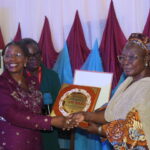At the Petroleum Training Institute (PTI) in Effurun, Delta State, fresh matriculants sat in neat rows, proudly dressed in ceremonial robes with excitement lighting up their faces. Among them sat 30-year-old Okpu Monday Chinekem, his face calm, his expression thoughtful, bearing the look of a man who has seen much more than the average student.
Unlike his Gen Z counterparts whose lives are still marked by the early rhythms of youth, Chinekem stood out—not just for his age but for the journey he had travelled, and the truths he was ready to speak. He was not there for photographs and fanfare. He was there because of a stubborn dream. And he had a lot to tell Saturday Tribune.
“It’s a shame,” he said quietly, “that in a country like Nigeria, education has become a luxury. Not because people don’t want to learn, but because the government has made it nearly impossible.”
In 2020, when he first arrived at PTI as a part-time student, the fees were high but manageable. He paid N80,000 for his programme, while full-time students paid N60,000.
“But today,” he said, shaking his head, “we are paying N183,000. It’s outrageous. That’s more than double in just five years. How can anyone in my shoes afford that without suffering?”
The sharp increase, he says, is a direct reflection of the larger economic hardship biting Nigerians, especially in the Niger Delta where the proverbial golden egg is laid.
“This isn’t just about PTI. This is what the Nigerian economy has done to the average person, particularly in the Niger Delta. Fuel prices have gone up, food is unaffordable, and now, even education—our only ladder out of poverty—is being taken away from us.”
Chinekem’s voice carries no bitterness, only deep disappointment.
“If the government really cared about education,” he said, “they wouldn’t let school fees rise like this. They would subsidise education. But what we are seeing is total neglect.”
For Chinekem, education has never been a casual affair. After finishing primary school, he stayed home for two years—not because he wasn’t qualified for the next stage, but because he wanted to learn a skill.
“I joined my father in his welding workshop. I wanted to have something in my hands first,” he said.
When he finally enrolled in a Government Technical School, he was tested and given a double promotion to catch up with peers who were years ahead.
“I completed my secondary education in 2018, and then I went to Port Harcourt to hustle. I worked as a welder, then as a security man earning just N20,000 per month. But I never lost sight of my dream.”
In 2020, he got admission to PTI’s part-time programme. For two years, he juggled studies with survival. He later went for Industrial Training at a welding firm and finally applied for the full programme in Welding Engineering and Fabrication Technology.
“I just kept pushing. I want to be educated. I want to be an employer of labour one day. That’s my dream.”
Yet today, the same dream is slipping out of reach for many. Chinekem worries that if fees keep rising, young people like him—without rich parents or political connections—will be locked out of education forever.
“Young people are not lazy. We are just tired. And it’s frustrating to know that your country is not backing your efforts.”
He makes no apologies for speaking plainly.
“I’m not saying the government must do everything for us. But they must at least make education accessible. If we want to rebuild Nigeria, we must start from the classrooms.”
He is not married yet, and he says it is because of the cost of living.
“I’m not financially ready for that. I can’t bring a wife and children into this kind of economic hardship.”
Despite the struggle, Chinekem does not judge others who have turned to crime or desperate means to survive.
“I don’t condemn anyone. I don’t know what they’ve been through. But I just hope more young people find strength to hold on like I did.”
And yet, somehow, through it all, he remains hopeful.
“Yes, things are hard. Yes, education is expensive. But I still believe there’s hope for Nigerian youths. People are still getting jobs. People are still rising. The key is to keep building ourselves.”
As the matriculation ceremony ended and his peers took selfies and celebrated, Chinekem stood quietly, holding his admission letter like a trophy.
“This moment means everything to me,” he said. “But I just hope it won’t be taken away from others because they can’t afford it.”
READ ALSO: Education Minister to Nigerians: Nigeria’s greatness lies in our collective efforts
WATCH TOP VIDEOS FROM NIGERIAN TRIBUNE TV
- Let’s Talk About SELF-AWARENESS
- Is Your Confidence Mistaken for Pride? Let’s talk about it
- Is Etiquette About Perfection…Or Just Not Being Rude?
- Top Psychologist Reveal 3 Signs You’re Struggling With Imposter Syndrome
- Do You Pick Up Work-Related Calls at Midnight or Never? Let’s Talk About Boundaries






